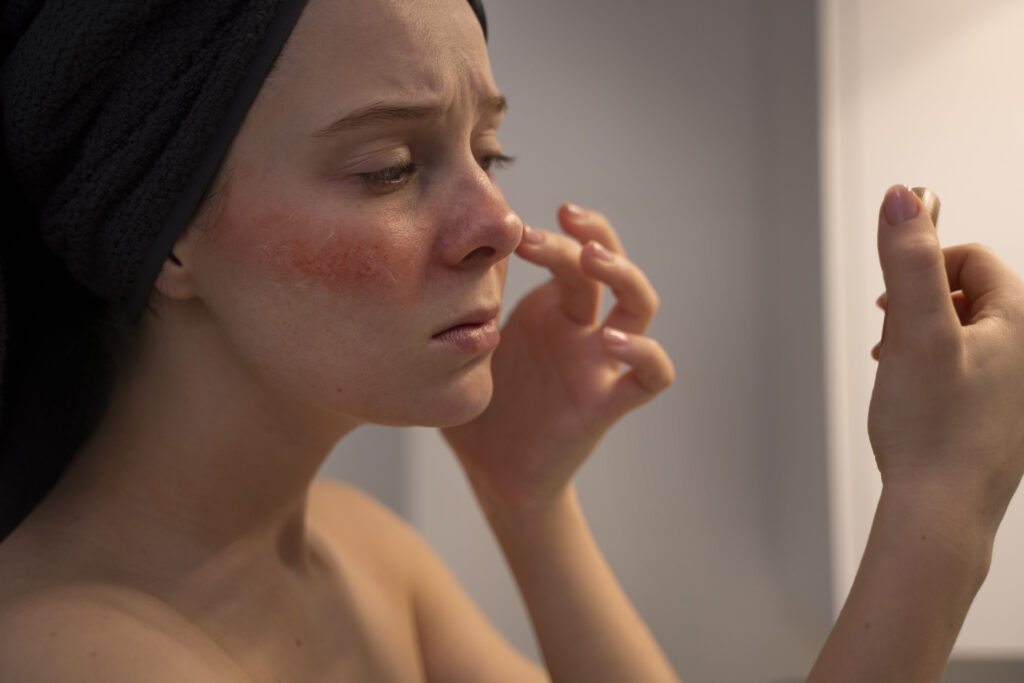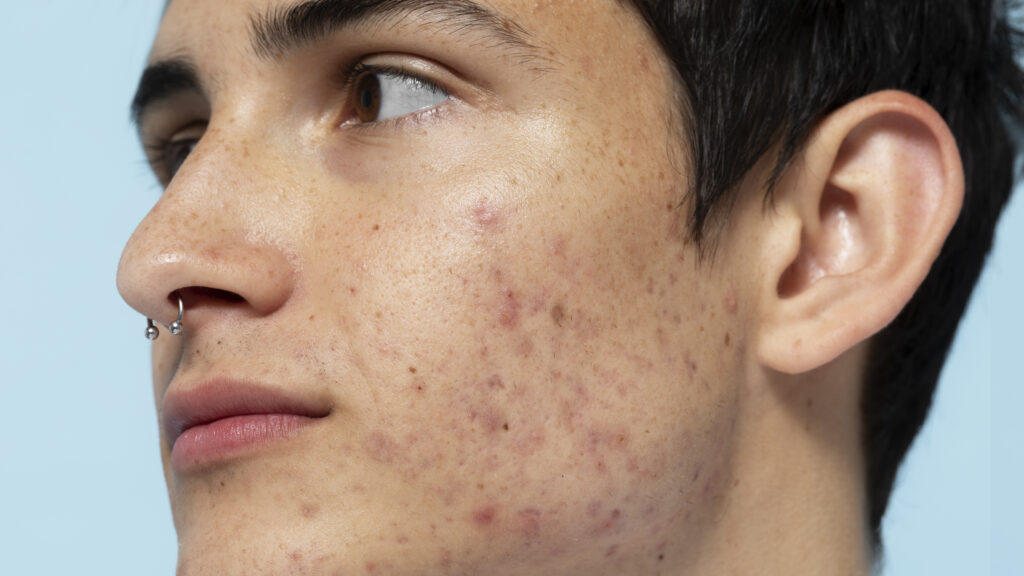Hey! Looking in the mirror? What do you see while looking in the mirror, dear? Is there a radiant, soulful you, smiling back at you? Or do you find your acne, pimples, rashes, and redness in your face staring at you? Yes, you are actually observing the relationship between skin and mind.
Your answer may be good or bad, but the reality will matter: no amount of serum, toner, or moisturizer can change your facial looks. Your appearance in the mirror may be affected by a bad breakout or a new dark patch, but the truth is that your basic perception of yourself comes from somewhere else, a deeper place in you.
Experts say that your skin reflects clearly what’s going on below the surface. This explains the role of skin in unveiling the condition of your inner body.
A mind-body connection can help you in finding the imperfections in your inner body and this will facilitate your skin’s relationship with your inner body world.
How to get a mind-body connection? With a little bit of compassionate care and mindful attention, you can develop a mind-body connection easily.
Mind-Skin Connection and The Science
Obviously, you will not find it a ‘woo woo’ theory that your mind and emotions are connected to your skin’s state. However there is a lot of scientific evidence that strongly supports the relationship between skin and the psyche.
For example, a 2019 study explained that psycho-social distress can be controlled with higher levels of mindful awareness. This also can improve your dermatological quality of life. In this specific experiment, 150 adult dermatology outpatients were studied and results showed that 40 percent of them were reported with significant social anxiety.

Researchers also support the theory that lower levels of present-moment awareness are associated with higher levels of skin shame. They also found during their research that mindfulness interventions can be helpful for people who experience social distress while living with a visible skin condition.Another study was made in 2020 to find the strong foundations for the relationship between skin and your inner world. The results revealed that cortisol and corticosterone are the two stress hormones produced in your body, and play a significant role in your skin’s health. These hormones affect your skin in different ways such as in:
- Wound healing.
- Aging process.
- Causing inflammation.
- Cell proliferation.
This study also explains the truth that a l; large number of dermatology patients, approximately 80 percent, agreed that their psycho-social distress is a major factor in developing various skin conditions.
Researchers worked on a higher research level in 2022 and found that nearly 40 percent of skin patients have clear symptoms of psychological issues. The researchers say that it is a difficult task to distinguish whether the basic cause of such problems is psyche or skin condition.
How are Skin Conditions Connected with Your Mind?
Here we will check the reality of the connection between your skin problems and your mind or mental health. Let’s start!
Mindfulness and Wound Healing
Mindfulness also affects your wound healing but its effects are positive. So your mental health affects your visible skin condition is a true theory.
According to a 2017 study, 59 adults found that those who underwent a 9-week mindfulness-Based Stress Reduction session showed higher levels of reduction in skin permeability and lower levels of interleukin factor compared with a control group.
These studies and their results prove that increased levels of mindfulness-based Stress Reduction sessions will be beneficial for the early stages of wound healing, though an advanced level of research is still needed.
Your Mental Health and Psoriasis
According to a survey report designed in 2018, in several clinical trials and medical reports, nearly 1625 people were found with psoriasis. Here the researcher came to a point of consideration that psychological factors both result from psoriasis and worsen, indicating a complex cause-and-effect relationship between psoriasis and mental stability. They kept on working and devised several promising interventions for the management of psoriasis, including:
- Interdisciplinary and educational interventions.
- Mindfulness-Based therapies.
- Cognitive Behavioral Therapy.
- Motivational Interviewing.
They also invite the experts to do more studies to determine the economic feasibility, efficacy, and practicality of these treatment options. A recent review in 2023, suggested that the relationship between depression, low esteem, and psoriasis should be researched more. They also described that out of their 130 patients with psoriasis, 8.7% wished for death, while 4.5% experienced suicidal ideation.
According to an older study from 2015, daily stressors influence psoriasis symptoms by increasing cortisol levels during high-stress moments. After this discovery, next year researchers found that stress is a cause of inflammation that leads to an inflammatory sympathetic nervous system that worsens the symptoms to stop the said disease. The authors of the theory also suggested that 40% to 50% of psoriasis patients also have sleep disorders that contribute to increasing stress or depression.
Stress and Eczema

This is another skin condition that is triggered by stress. According to 2020 research, people experiencing eczema or atopic dermatitis feel an itching sensation and also worry about itching, the condition is known as itch catastrophizing. In this study, 165 people with AD were treated at the rehabilitation center and they felt lessened itch catastrophizing after three mindfulness orientations. The mindfulness orientations include:
- Non-reactive orientation.
- Acting with awareness.
- Non-judgmental orientation.
The researchers summarized the results by announcing that psychological interventions that can increase acting awareness might have a buffering effect on itch catastrophizing, which results in lower itch intensity in AD patients.
Another study explains that stress and social deprivation have a negative impact on atopic eczema, similar to the effects of climate change and air pollution. In addition, a 2017 literature explains that there is a strong correlation between mothers experiencing stress and the risk of eczema in their children.
Another old study was found that supported the idea that eczema patients are mostly reported with:
- Self-criticism.
- Low-self esteem.
- Sleep pattern disorders.
- Indecision.
A Comprehensive Approach to Skin Care
You will find ample evidence in support of the link between stress, skin, and even mental health. But it is not guided anywhere on how to take the knowledge and apply it to improve your skin’s health.
According to skin experts, working in the department of skin caste in NEW YORK, your skin depicts the inner state of your body. This clarifies that your skin works as a boundary and screen upon which your emotions may present. They also explain that you can improve your skin’s health dramatically by focusing your mindset and making a commitment to mindfulness. Naturopathic medical officers also agree with these statements about a correlation between stress and skin.
According to naturopathic doctors of Skin Care Center, New York, many individuals have a concern for their skin, as it’s a direct reflection of the outside world. In the opinion of skin experts, your body always speaks to you, and noting changes in your skin health helps reveal the imbalances occurring internally. Your skin is the largest organ of your body and acts as a first line of defense against environmental pollutants, oxides, and toxins. Your skin also informs you about the imbalances that exist within your body. Often your emotions and unconscious stressors come out in the form of skin issues. For instance, a dermatologist points out that a compromised immune system, poor sleep, and stress may result in a recurrence of cold sores. Skin dryness indicates dehydration and a deficiency of healthy fat consumption. Acne on your face is a sign of an imbalance in bacterial colonies on your skin and food sensitivities. Lack of essential nutrients causes poor wound healing. Thus, your skin acts as a report card on how your body is handling the insults of life and internal imbalance manifests outwardly in radiant skin.
The Skin-Gut Connection
The researchers have a strong belief that your gut health and skin health are closely linked. The integrity of your digestive system reflects your skin’s health. You can reduce systemic inflammation in your gut drastically by taking care of your gut health. That will promote healthy skin. The amount of toxins in your blood and blood plasma can be indicated by your skin. In the same way, the imbalances you see in your skin are helpful signs that you need to care for your digestion and food drink intake. The scientific studies also support this perspective as well.
According to a 2022 study, skin diseases can cause alterations in your gut and skin microbiome. The difference between the biome of your skin or gut is directly associated with an altered immune response. This can promote more skin issues, including:
- Skin cancer.
- Dandruff.
- Acne vulgaris.
- Psoriasis.
- Atopic dermatitis.
Research was made in the recent era that concluded that there is a strong link between psoriasis and gut microbial alteration, though more large-scale studies with uniform standards are required. A review of this theory suggests that emotions such as depression, anxiety, and stress can aggravate acne by altering the gut microbiota and increasing your intestinal permeability which can lead to skin inflammation.
Listen to Your Skin
Try to learn to listen to your skin so you may give it the required attention and care. To listen to your skin, focus on the following areas:
- Practice mindfulness in your skincare routine.
- Eliminate pollutants and toxins.
- Reduce anxiety and stress.
- Improve your sleep quality.
- Eat gut and skin health-supporting food.
- Take sun protection by enhancing sun exposure.
- Drink plenty of water.
Mindful Skincare Routine
Hey! Want to keep your skincare routine simple? You can follow these simple steps:
- Use a toxin-free cleanser containing calendula, roe, chamomile, and aloe vera.
- Apply an oil-based natural serum containing coconut or sunflower oil.
- Use a sugar-based exfoliant thrice a week.
- Apply a face mask made with natural ingredients to pull deeper toxins from your skin.
- And on top of all, focus on a realistic mindset.
To do your best to be mindful, always thank your skin for enduring all of the weather, and seasons of both the day and your life. Trying to be realistic with your facial practices and not expecting to have protected golden youthful skin can help you in getting flawless youthful skin.
A skincare specialist points out that change in the living or non-living world is inevitable and your body can’t; last forever but you can do your best to care for your skin and body by focusing the messages received through your skin and adjusting accordingly. For instance, Food sensitivities and lower hydration levels appear in the form of occasional blemishes. You can perform dry brushing to encourage lymphatic drainage and healthy blood flow in your body to nourish your skin in a better way.
Elimination of Toxins
Skin detoxifies your organs by minimizing the amount of toxins coming inside the body. The skin performs this function via liver function that helps in removing toxicity and reducing the impurities getting in. You should follow a skincare routine that focuses on maintaining a healthy microbiome with gentle products.
Reduction in Stress

In times of distress, your skin surely expresses your feelings with heated responses like rashes, hives, blushing, or sweating. You may also feel sensations of cold and fear on your skin through cold constrictions which results in wrinkles or skin dryness. Thus heightened emotional stress can impair your organ functions, which may lead to inflammation. You should enjoy meditating in an infrared sauna. That can help you pay attention to sensations in your body and navigate your mental health.
High-Quality Sleep
Good sleep is a core strength of skin health. Getting enough high-quality sleep that involves a complete sleep cycle can reduce your anxiety and encourage your skin’s health.
Conclusion
Desire to promote your skin’s health will take you towards the ways of listening to your skin. You don’t need any expensive or latest supplement, device, or procedure to get optimal skin health. Because it’s your body that always tries to find balance for itself and heal itself.
How can you help your body? A balanced combination of exercise, good diet, high-quality sleep, rest, and closeness to nature are the best remedies you can provide to your body at a very low cost. If you are asked to describe the requirement of your body and skin for remaining fit and fresh, just say it,
Laugh often and chill out frequently.







